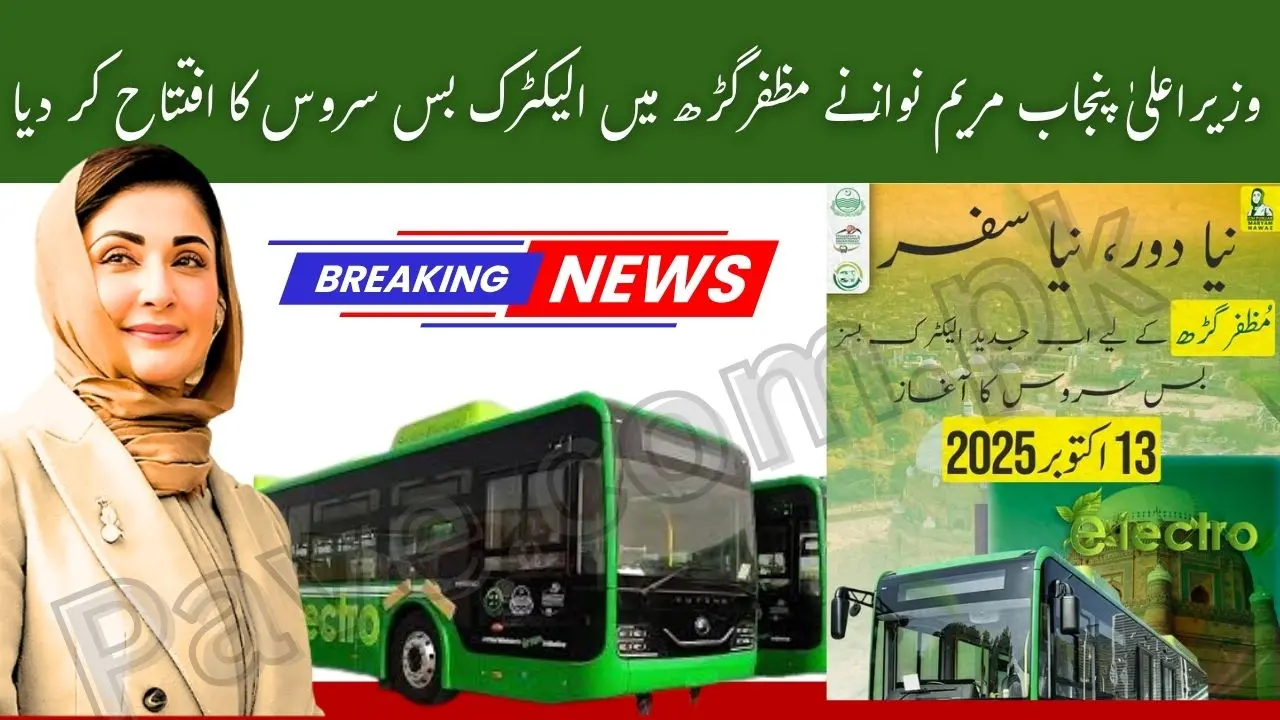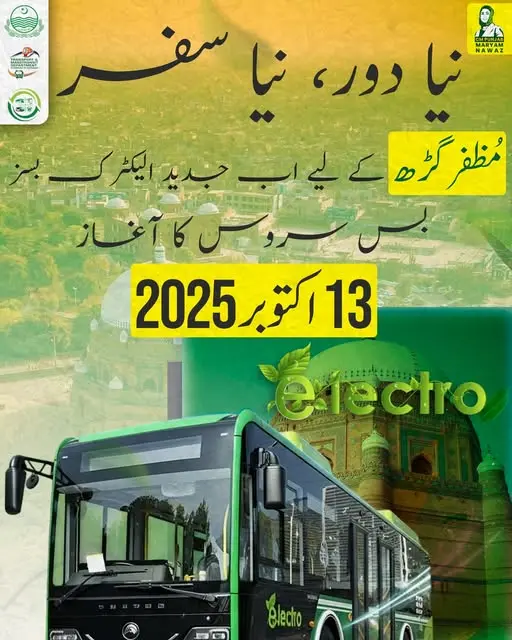CM Punjab Launches Electric Bus Service in Muzaffargarh 2025 – Green Transport Revolution Begins

CM Punjab Launches Electric Bus Service in Muzaffargarh 2025, marking the dawn of a revolutionary chapter in Pakistan’s journey toward sustainable and eco-friendly transportation. On October 13, 2025, Chief Minister Maryam Nawaz Sharif officially inaugurated the first-ever “Electro” Electric Bus Service in Muzaffargarh — a city that now becomes a model for green mobility in South Punjab.
This initiative, under the broader Punjab Green Transport Vision, aims to reduce air pollution, cut fuel consumption, and introduce modern transport facilities for citizens in smaller cities, not just major metropolitan areas. It’s part of the government’s mission to bring environmental innovation, economic relief, and technological advancement to the public sector.
🚍 Transforming Public Transport in Punjab
For decades, public transport in Punjab’s smaller cities has struggled with aging buses, poor maintenance, and rising fuel prices. With the launch of the Muzaffargarh Electric Bus Service 2025, the provincial government has taken a major step to modernize transport infrastructure.
This new fleet of Electro-branded electric buses is equipped with the latest technologies — from digital route systems to smart ticketing — ensuring convenience, safety, and efficiency. It’s a big leap forward from the diesel-powered, high-emission buses that previously dominated the city’s streets.
CM Maryam Nawaz emphasized that this project would not only make travel affordable but also reduce the city’s carbon footprint drastically.
“This is not just about buses — it’s about building a cleaner and smarter Punjab,” she said during the launch ceremony.
🌱 Green Vision: The Electro Bus Initiative
The Electro Bus Project represents a modern blend of environmental policy and technological progress. Designed under the Punjab Green Transport Policy, the project focuses on achieving zero-emission mobility within the next five years.
Each electric bus operates fully on renewable electricity, contributing to the Clean & Green Punjab initiative that supports Pakistan’s commitments under the Paris Climate Agreement.
Key features of the new electric buses include:
- 100% zero carbon emissions
- Silent electric motors to minimize noise pollution
- Air-conditioned comfort and ergonomic seating
- Digital display systems for real-time route updates
- Smart card and mobile app ticketing
- On-board Wi-Fi and surveillance cameras for passenger safety
These innovations make the Electro Bus Service one of the most advanced forms of public transportation in Pakistan.
Check Also: Breaking News: Launch Date for Rawalpindi’s Electric Bus Service Announced
⚡ Charging Infrastructure and Technological Integration
To sustain the electric bus network, the Punjab Transport Department has installed fast-charging stations across Muzaffargarh. Each depot can recharge multiple buses simultaneously, with an average charging time of just one hour for a full battery.
A modern solar-powered charging facility has also been integrated to reduce electricity costs and make the system self-sustaining in the long run.
Through smart management software, all buses are tracked for route optimization, maintenance schedules, and battery health. This ensures maximum uptime and minimal service interruptions for passengers.
🏛️ Maryam Nawaz’s Vision for Green Mobility
Chief Minister Maryam Nawaz has repeatedly highlighted her ambition to make Punjab a climate-smart province. Her government has already introduced policies in renewable energy, waste management, and public sector digitalization.
At the Muzaffargarh launch event, she described the Electric Bus Service as “a step toward equitable and sustainable progress.”
She added that the government’s goal is not limited to large cities like Lahore or Multan — rather, the focus is to ensure equal access to modern services for all citizens across Punjab.
“Every resident, whether in a big city or a small town, deserves clean air, affordable transport, and a better quality of life,” she said.
This inclusive approach has positioned her administration as a pioneer in both environmental policy and social welfare.
💡 Economic, Social, and Environmental Benefits
The Electric Bus Service 2025 offers multidimensional benefits to both the economy and the environment:
🔸 1. Reduced Fuel Imports
Since these buses operate entirely on electricity, Punjab’s dependence on imported diesel will decrease, helping the provincial budget save millions annually.
🔸 2. Affordable Transportation
The government has promised subsidized ticket fares so that students, working women, and laborers can travel comfortably at minimal cost.
🔸 3. Clean Air and Health Benefits
According to environmental experts, switching to electric mobility could cut urban air pollution by up to 40% in Muzaffargarh within three years.
🔸 4. Local Job Creation
The project will create hundreds of jobs in areas such as electric bus maintenance, charging station operations, and technical supervision.
🔸 5. Digital and Technological Growth
By promoting smart ticketing and digital transport systems, Punjab is aligning itself with global standards of urban mobility.
Read Also: 500 Electric Buses to Be Introduced in Karachi and Hyderabad
🔋 How the Electro Bus System Works
Each bus runs on a high-capacity lithium-ion battery, capable of covering up to 250–300 kilometers per charge. The buses use regenerative braking, which stores kinetic energy to extend battery life.
Charging stations are strategically placed at:
- Muzaffargarh City Bus Terminal
- Chowk Qureshi Station
- College Road
- District Hospital Route
- Industrial Bypass Hub
The government plans to integrate solar microgrids at these points by mid-2026 to further reduce energy costs.
🚦 Operational Routes and Passenger Capacity
In the first phase, the Electro Bus Service covers the following routes:
- Main City Terminal → Chowk Qureshi
- College Road → Railway Station
- District Hospital → Government College Stop
- Industrial Bypass → Mall Road Circle
Each bus can carry 50–60 passengers, including dedicated spaces for women and disabled commuters. The frequency of service will be every 10–15 minutes, ensuring a smooth and regular commute during peak hours.
📈 Future Expansion Plans
The success of the Muzaffargarh phase will determine future expansion under the Punjab Green Mobility Plan 2025–2030.
Next on the list are Dera Ghazi Khan, Bahawalpur, and Sahiwal, followed by Lahore’s inner routes where the electric fleet will gradually replace diesel buses.
By 2026, the Punjab government aims to deploy over 1,000 electric buses province-wide, transforming the public transport system completely.
Read Also: Six Electric Vehicles Launched in Pakistan by Capital Smart Motors – Zeekr & JMEV Models Revealed
🤝 Public-Private Partnerships
This project is being implemented through a Public-Private Partnership (PPP) model involving:
- Punjab Transport Department
- Urban Unit Lahore
- Private EV Manufacturers and Investors
Private partners will handle bus operations, maintenance, and charging infrastructure, while the government provides regulatory support and fare subsidies.
This collaboration not only attracts investment but also ensures long-term sustainability of the electric fleet.
📣 Public Reaction and Awareness
The response from citizens has been overwhelmingly positive. Social media platforms like X (formerly Twitter) and Facebook have been flooded with posts praising CM Maryam Nawaz for prioritizing green mobility and public welfare.
Hashtags like #ElectroBusPunjab, #MuzaffargarhGreenTravel, and #MaryamNawazVision2025 trended across Punjab within hours of the inauguration.
Commuters have expressed excitement about the comfort, cleanliness, and affordability of the new buses. Environmental activists have also praised the step as a “turning point for Pakistan’s climate policy.”
🧭 Challenges and Sustainability Goals
While the project is groundbreaking, the government faces challenges such as:
- Maintaining continuous electricity supply for charging
- Managing operational costs
- Expanding awareness in rural areas
- Training technicians for EV maintenance
However, under the Punjab Sustainable Transport Policy, CM Maryam Nawaz’s government has committed to providing regular training programs, establishing technical colleges for EV skills, and ensuring uninterrupted service through solar energy integration.
This ensures that the Electro Bus Project not only survives but thrives as a long-term, sustainable public transport model.

🔰 Conclusion – Driving Punjab Toward a Sustainable Tomorrow
The Electric Bus Service in Muzaffargarh 2025 is more than a transport initiative; it’s a symbol of progress, innovation, and environmental care. Chief Minister Maryam Nawaz has proven once again that visionary leadership can drive positive change in every corner of Punjab.
By embracing electric mobility, Punjab has positioned itself as a regional leader in green transportation, setting an example for other provinces — and even neighboring countries — to follow.
As these quiet, zero-emission buses glide through the streets of Muzaffargarh, they represent more than movement; they represent hope — for cleaner air, smarter cities, and a brighter, greener Pakistan.
Check Also: Breaking News: Khushhali Bank Launches Commercial Vehicle Financing 2025 – Loans up to Rs 5 Million
❓FAQS About CM Punjab Launches Electric Bus Service in Muzaffargarh 2025:
Q1. When was the Electric Bus Service launched in Muzaffargarh?
A1. The Electric Bus Service was launched on October 13, 2025, by CM Punjab Maryam Nawaz.
Q2. What is the goal of the Electro Bus Project?
A2. Its main goal is to reduce carbon, promote affordable transport, and modernize public commuting in smaller cities.emissions
Q3. How many routes are currently active in Muzaffargarh?
A3. Four main routes are active, connecting major city points such as Chowk Qureshi, College Road, and the District Hospital.
Q4. Are these buses entirely electric?
A4. Yes, all “Electro” buses are 100% electric with zero emissions and low operating costs.
Q5. Which other cities will get this service next?
A5. The Punjab government plans to expand the service to Dera Ghazi Khan, Bahawalpur, Vehari, and Sahiwal in the next phase.







